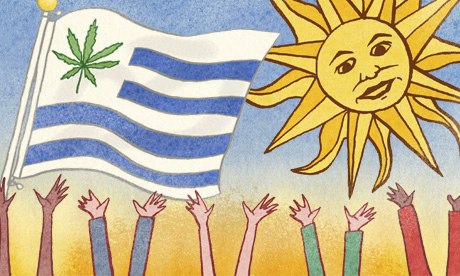The war on the war on drugs is the only war that matters. Uruguay's stance puts the UN and the US to shame

'Uruguay will legalise not only cannabis consumption but, crucially, its production and sale.' Illustration by Satoshi Kambayashi
I used to think the United Nations was a harmless talking shop, with tax-free jobs for otherwise unemployed bureaucrats. I now realise it is a force for evil. Its response to a truly significant attempt to combat a global menace – Uruguay's new drug regime – has been to declare that it "violates international law".
To see the tide turn on drugs is like trying to detect a glacier move. But moving it is. Wednesday's statute was introduced by the Uruguayan president, José Mujica, "to free future generations from this plague". The plague was not drugs as such but the "war" on them, which leaves the world's youth at the mercy of criminal traffickers and random imprisonment. Mujica declares himself a reluctant legaliser but one determined "to take users away from clandestine business. We don't defend marijuana or any other addiction, but worse than any drug is trafficking."
Uruguay will legalise not only cannabis consumption but, crucially, its production and sale. Users must be over 18 and registered Uruguayans. While small quantities can be grown privately, firms will produce cannabis under state licence and prices will be set to undercut traffickers. The country does not have a problem on the scale of Colombia or Mexico – just 10% of adults admit to using cannabis – and stresses that the measure is experimental.
This measured approach is still way in advance even of American states such as Colorado and Washington, which have legalised recreational as well as medical cannabis consumption, but not production. While the Uruguayan law does not cover other drugs, by depriving traffickers of an estimated 90% of their market, the hope is both to undermine the bulk of the criminal market and to diminish the gateway effect of traffickers pushing harder drugs.
Mujica's courage should not be underrated. His is a gently old-fashioned country, and two-thirds of those polled oppose the move, though this is up from 3% a decade ago. In addition some pro-legalisation lobbies object to his de facto nationalisation. An open question is whether a state cartel will be as effective as a regulated free market. But the drugs chief, Julio Calzada, is blunt: "For 50 years, we have tried to tackle the drug problem with only one tool – penalisation – and that has failed. As a result, we now have more consumers, bigger criminal organisations, money laundering, arms trafficking and collateral damage."
The response of the UN's International Narcotics Control Board has been to incant futile bromides. The move, says its chief Raymond Yans, would "endanger young people and contribute to the earlier onset of addiction". It would also be in breach of a "universally agreed and internationally endorsed treaty". Yet the UN admits that half a century of attempted suppression has led to 162m cannabis users worldwide, or 4% of the total adult population .
The 78-year-old Mujica notes the irony that many of his South American contemporaries agree with him, but only after leaving office. They include Brazil's Fernando Cardoso, Mexico's Ernesto Zedillo and Colombia's César Gaviria, all of whom have now called for the decriminalisation of the drug market so that they can begin to regulate a trade whose feuding operators are killing thousands of people each year. Thevalue of the drugs trade is second only to the trade in arms. Yet the US resists decriminalisation so it can continue to fight cocaine and opium production in Latin America and Afghanistan, to avoid confronting the real enemy: a domestic consumption that is out of control.
For all this, the futility of suppression is leading to laws crumbling across the west.Twenty US states have legalised medical cannabis. California this year narrowly rejected taxing consumption (turning down an estimated $1.3bn in annual revenue) and may yet relent. Drug use is accepted across most of Latin America and, de facto, Europe. Even in Britain, where possession can be punished by five years in prison, just 0.2% of cases prosecuted result in such a sentence. The most intensive drug users are said to be in the state's own jails. The law has effectively collapsed.
The difficulty now is to resolve the inconsistency of enforcers "turning a blind eye" to consumption while leaving supply (and thus marketing) untaxed and unregulated in the hands of drug traffickers. This is little short of a state subsidy to organised crime. Indulgence may save the police and the courts from the cost of enforcement, but it leaves every high street open to massive cross-jeopardy, from cannabis to hard drug use.
Ending this inconsistency requires action from legislators. Yet they remain seized by a lethal mix of taboo, tribalism and fear of the media. British policy on all intoxicants and narcotics (from booze to benzodiazepines) is chaotic and dangerous. The government on Thursday admitted its inability to control "legal highs", new ones being invented every week. It is running round back-street laboratories waving bans and arrest warrants like the Keystone Cops.
The catastrophe of death and anarchy that failed drug suppression has brought to Mexico and to other narco-states makes the west's obsessive war on terror seem like a footling sideshow. The road out of this darkness is now being charted not in the old world but in the new, whose heroic legislators deserve to be awarded a Nobel peace prize. It is they who have taken on the challenge of fighting the one world war that really matters – the war on the war on drugs. It is significant that the bravest countries are also the smallest. Thank heavens for small states.

No comments:
Post a Comment